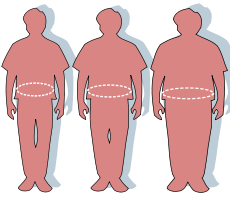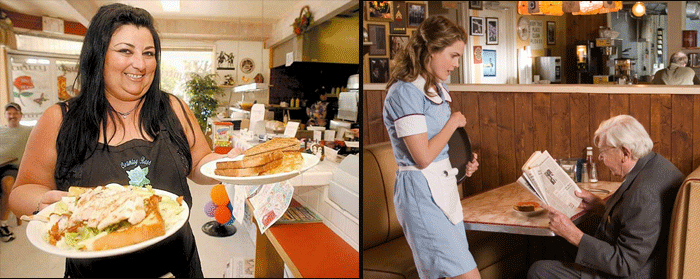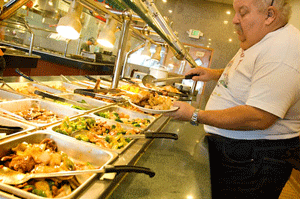

by Geraldo Fuentes for viewzone
What is obesity?
Throughout history there have been obese people. Before food was widely available, being fat was considered a privilege enjoyed only by the wealthy and elite. These days, it is pretty much the norm.
 Obesity is a medical condition in which excess body fat has accumulated to the extent that it may have an adverse effect on health, leading to reduced life expectancy and/or increased health problems. Usually, obesity happens as we age. Our intake of food surpasses our daily energy requirements as we "slow down".
Obesity is a medical condition in which excess body fat has accumulated to the extent that it may have an adverse effect on health, leading to reduced life expectancy and/or increased health problems. Usually, obesity happens as we age. Our intake of food surpasses our daily energy requirements as we "slow down".
In the past couple of years scientists have discovered that a special gene, called FTO, is responsible for causing weight gain and obesity. But this gene is present in only 16% of people with European descent. Obesity is even more prevalent so there are obviously other factors at play.
The top 5 countries with the most obese people are (in order) America, Mexico, United Kingdom, Slovakia and Greece. The thinnest people live in (in order) Japan, Korea, Switzerland, Norway and Italy. Italy? Yes, it's hard to imagine staying svelte on a diet of pizza and pasta but Italians know the meaning of moderation. Healthy eating involves much more than what we eat -- it's how we eat that puts on the pounds.
The myth of obesity is that it results from a lack of self control. This is an over simplification of the problem that has perpetuated discrimination against big people, causing them to suffer social isolation and humiliation. So what's really going on?
"Chinese restaurant don't rike fat waitress..."
When Rose [bottom left] applied for a waitress job at her local Chinese restaurant in Worcester, Massachusetts, despite years of experience, she was treated rudely and didn't get the job. When she left the restaurant, a friend was sitting at the bar. He overheard the manager saying that he would never hire a "fat waitress". Well, perhaps the joke was on him.
According to a new study published in the Journal of Consumer Research [1] customers will order more food from an overweight waitress than a thin one. The research suggests that merely seeing someone who is strongly associated with an undesirable behavior (i.e. overeating) leads to surprising increases in the behavior. Psychologists explain it this way:
"Seeing someone overweight leads to a temporary decrease in a person's own felt commitment to his or her health goal."

In the study, researchers asked people who were walking through a lobby if they would take a quick survey. The surveys had photos of an overweight person, a person of normal weight, or a lamp (the control). After completing the survey, which was not scored, the researchers asked the participants to help themselves from a bowl of candy as a "thank you".
"People who completed the survey that included a picture of someone who was overweight took more candies on average than people who saw either of the other two pictures."
In another experiment, people who were invited to do a cookie taste test ate twice as many cookies or candy after seeing someone who was overweight. So did the Ding Ho restaurant make a bad business decision when they didn't hire Rose? That depends on whether or not they offer a buffet.
Temples of overeating
In his book, Mindless Eating: Why We Eat More Than We Think, Brian Wanink quotes an recent study conducted by Cornell University that observed differences in the way overweight people react to Chinese buffets. He found that overweight individuals sat 16 feet closer to the buffet, faced the food, used larger plates, ate with forks instead of chopsticks, and served themselves immediately instead of browsing the buffet to see what was available [2].
"What's crazy is that these people are generally unaware of what they're doing -- they're unaware of sitting closer, facing the food, chewing less, and so on."
The company you keep
 Another factor that leads to overeating can be traced to the company you dine with. If you are a woman who dines with a man, chances are you choose food with fewer calories than if you dine with a woman. [3] A report in the journal Appetite found that women who ate with a male companion chose foods of significantly lower caloric value than did women who were observed eating with another woman.
Another factor that leads to overeating can be traced to the company you dine with. If you are a woman who dines with a man, chances are you choose food with fewer calories than if you dine with a woman. [3] A report in the journal Appetite found that women who ate with a male companion chose foods of significantly lower caloric value than did women who were observed eating with another woman.
Additionally, when women ate in mixed-gender groups their food choices were at the lower end of the caloric scale; the more men in the group the fewer the calories. When women ate in all-female groups, their food was significantly higher in calories.
Were the women trying to appear more attractive to males? Possibly, since food choices appear to be weighed against how other perceive them. In other words, smaller, healthier portions are seen as more feminine, and women might believe that if they eat less they will be considered more attractive to men.
"It is possible that small food portions signal attractiveness, and women conform, whether consciously or unconsciously, to small meals in order to be seen as more attractive."
So when 'the girls' go out to eat at Ding Ho's buffet, especially if their hostess is big -- look out!
And the guys... well they ate the same regardless of which gender accompanied them at he table. And why not. They are proving that they are good providers. A Canadian study demonstrated that men with bigger wallets have bigger waistlines.
The study used data from the 2004 Canadian Community Health Survey (CCHS). This provided access to information from some 7,000 adults aged 25 to 65. This research is unique because it took into consideration the sex of individuals as well as their body mass index (BMI) to differentiate the overweight from the obese.
Many epidemiological studies have established that the odds of being overweight or obese decrease as family income increases. But we don't know why this relationship is inverted for Canadian men. Hmmm.
"Since the 1980s, the greatest increase in obesity levels has been among rich Canadian and Korean men... People who regularly eat out have no control over what they eat. They also tend to eat more calories and consume larger amounts of alcohol. Too many restaurant meals, combined with a decrease in physical activity, is another possibility. There are obviously various factors at play: we still haven't empirically proved them.
Don't blame the restaurants
It's easy to attribute high caloric food to the unhealthy menus of restaurants; but there's more to the story than the lack of healthy low-calorie food. According to the Journal of Consumer Research, having a healthy food on a menu can actually make people eat more rich and fatty foods [4].

Consider this: you are approached by a waitress who tells you the specials of the day. Each item includes a side order of either French fries, a baked potato or a green salad -- all the same price. Which would you order? According to experiments by researchers at Duke University, just seeing the salad on the menu will make most people go for the fries -- even if they usually choose to eat healthy.
"It's an effect called vicarious goal fulfillment, in which a person can feel a goal has been met if they have taken some small action, like considering the salad without ordering it"
According to the study, consumers may feel they have fulfilled a healthy eating goal even if they choose an unhealthy food, and the presence of a healthy option among food choices may draw their attention to the least-healthy choice available.
In another study, participants chose from a menu that included French fries, chicken nuggets, and a baked potato or these items plus a side salad. After being told that each item cost the same amount of money, respondents were instructed to choose a side dish for their lunch.
As predicted, when given the choice of fries, chicken nuggets, or a baked potato, people high in self-control rarely chose the fries, which are considered the least-healthy option in the set. However, add the salad to the set and what happens? High self-control individuals were significantly more likely to choose the French fries." The opposite was true for people with low self-control.
Big problems for kids
 A recent CNN top story declared that "Fat is the new ugly on the playground" [5]. The emotional scars from early social rejection can persist over a lifetime. While it is true that children's weight has increased over the past decades, it seems clear that they are not to blame.
A recent CNN top story declared that "Fat is the new ugly on the playground" [5]. The emotional scars from early social rejection can persist over a lifetime. While it is true that children's weight has increased over the past decades, it seems clear that they are not to blame.
Evidence shows that childhood obesity, although predisposed by genetics, is also result of parental negligence and ignorance. The University of Melbourne (Australia) found that four in ten parents of overweight children were unaware of their kid's weight problem and viewed them as "normal" [6]. Some parents believed their children were underweight when the opposite was obviously true.
"Parents are unlikely to take the necessary preventative actions if the perception of their child's weight -- whether underweight or overweight -- is incorrect."
These findings were similar to those reported in ScienceDaily (March 2009) which found that 17 percent of US children between ages 2 and 19 are classified as obese, yet parents are likely to misperceive their child's weight. This is especially true if those parents are overweight themselves [7].
"...Parents are the most influential factor in laying the foundation for early childhood weight problems... Parents were more likely to misperceive their child's weight, regardless of the child's age. Across the literature, mothers failed to accurately recognize the weight of their at-risk-for-overweight or overweight children.
If parents do not recognize their child as at risk for overweight or overweight, they cannot intervene to diminish the risk factors for pediatric obesity and its related complications."
This error also extended to the child's own perception of their size. Only 4/10 underweight girls and half of underweight boys correctly assessed their own weight.
"Is there a 'skinny gene'?"
A 2011 study by UCL found that children with thinner parents are three times more likely to be thin than children whose parents are overweight. Over 7000 families participated in the study, published in the Archives of Pediatrics & Adolescent Medicine which showed a strong association between children's and parents' body size [8].
When both parents were in the thinner, healthy-weight range, the chance of the child being thin was 16.2%, compared with 7.8% when both parents were in the healthy weight range, 5.3% with two overweight parents, and only 2.5% for children with two obese parents.
Previous research showed that obesity runs in families partly because of parent-to-child transmission of multiple genes conferring a higher risk for adiposity (fatness). Finding that thinness in children is related to thinness in parents suggests that thinness may be inherited in the same way, with children of thinner parents being likely to be genetically predisposed to have a lower body weight. In this study, the authors did not find any differences between the effects of mothers' and fathers' weights on child thinness.
Lead author of the study, Dr Katriina Whitaker, UCL Epidemiology & Public Health, commented:
"We know from other studies that children's weights are correlated with those of their parents, but previous research has tended to focus on obesity rather than the other end of the spectrum."
Professor Jane Wardle, UCL Epidemiology & Public Health, added:
"Parents are often concerned if their child is thin, but it may just be their 'skinny genes'. All genes have two versions, called alleles. We might think of weight-related genes as having a 'skinny' and 'curvy' allele. Thinner parents are likely to have more of the skinny alleles, increasing the chance of passing them on to their children. A child who inherits more of the skinny alleles from their parents will be naturally thinner."
Predicting obesity in children
According to new research from the Monell Center, the degree of change in blood triglyceride levels following a fatty meal may indicate susceptibility to diet-induced obesity. The findings open doors to new methods of identifying people, including children, who are at risk for becoming obese. Triglycerides are a form of fat that is transported in the blood and stored in the body's fat tissues. They are found in foods and also are manufactured by the body [9].
"These findings suggest we may someday be able to use a simple blood test to identify those at risk for obesity. The ability to identify more susceptible individuals would make it possible to target obesity-prevention resources on those who need them most."
The global obesity epidemic is very real and thought to be caused, in part, by consumption of a diet high in fat and carbohydrates, which promotes weight gain. This propensity to gain weight and become obese when consuming a high-fat diet is at least partially controlled by genes, with some individuals gaining more than others while eating the same diet.
In the study, published in the International Journal of Obesity, Friedman and lead author Hong Ji, PhD, screened rats for vulnerability to diet-induced obesity by measuring the increase in blood triglyceride levels following a single high-fat meal. They then fed the rats a diet high in fat over the next four weeks.
The researchers were able to predict which animals would become obese over the four-week period by examining the earlier metabolic response to the high-fat meal: the smaller the triglyceride change, the greater the weight gain.
There currently are no simple biomarkers for predicting susceptibility to diet-induced obesity, and thus no clinical tests that assist physicians in identifying those at risk for becoming obese. The current findings suggest that a change in blood triglyceride levels may someday be used as such a tool. The next breakthrough will come with the investigation of the exact mechanism behind differences in the change in blood triglycerides [ibid].
"The differences in weight gain associated with high-fat diets indicate that genetically-determined factors contribute to obesity. We have shown that these genetic factors are related to the body's ability to burn fat. We now need a better understanding of how this relates to blood triglyceride levels."
Sometimes being overweight is not bad
A survey of nearly 4,000 Americans finds that obese women reported significantly worse health than obese men. But the surprise was that Blacks who were overweight reported better health than blacks in the normal or obese weight categories. So it appears that, for Blacks anyway, being overweight -- but not obese -- optimizes health [10].
 The study did not look at why extra weight seems to be less of a burden for blacks and more of a burden for women, but there are several possible explanations that need to be explored.
The study did not look at why extra weight seems to be less of a burden for blacks and more of a burden for women, but there are several possible explanations that need to be explored.
Another study by the University of Warwick found that overweight people stay happy as they get old [11]. The researchers analyzed lifestyle and health patterns in more than 10,000 people and their links to participants' mental and physical quality of life and health status. Quality of life was evaluated using a measure which takes in eight different factors including perception of general health, pain, social functioning and mental health.
The researchers found that people reported better mental quality of life as they age, despite a decrease in physical quality of life. The report suggests that happiness levels follow a U-shape curve with their lowest point in the mid-40s, after which they rise as people move into older age.
The researchers also found that being overweight or obese did not have a significant impact on mental well-being levels, with people with a BMI of more than 30 showing similar mental quality of life levels to those considered to be a "healthy" weight.
For women in the US, low levels of physical exercise did not appear to impact on their mental well-being. This was not the case for men, where limited physical exercise had a significant adverse impact on their mental quality of life.
"It's obvious that people's physical quality of life deteriorates as they age, but what is interesting is that their mental well-being doesn't also deteriorate -- in fact it increases.
"We suggest that this could be due to better coping abilities, an interpretation supported by previous research showing older people tend to have internal mechanisms to deal better with hardship or negative circumstances than those who are younger.
"It could also be due to a lowering of expectations from life, with older people less likely to put pressure on themselves in the personal and professional spheres. "With regard to our findings on excess body weight and its lack of significant impact on mental-wellbeing -- this has been reported in previous research, i.e. the so-called "jolly fat" hypothesis, although not consistently."
Overweight people have overweight friends -- is this good or bad?
Scientists from the Institute of Prevention Research at the Keck School of Medicine of the University of Southern California (USC) found in a recent study that overweight youth were twice as likely to have overweight friends [12].
"Although this link between obesity and social networks was expected, it was surprising how strong the peer effect is and how early in life it starts," says lead author Thomas Valente, Ph.D., professor of preventive medicine at the Keck School of Medicine.
The study appears in the August issue of the Journal of Adolescent Health.
"The findings certainly raise health concerns because when kids start associating only with others who have a similar weight status it can reinforce the negative behaviors that cause obesity.
"Researchers tend to focus mainly on health consequences when talking about weight with adolescents. But we also need to be sensitive to the reality that there can be a social cost for overweight youth as well.""
Interventions should take these peer constructs into account, he says. For parents and educators, this may mean being conscious of potential social consequences that children may suffer as a result of being overweight; and acknowledge that many of the behaviors which contribute to obesity are social in nature.

[1] Margaret C. Campbell and Gina S. Mohr. Seeing is Eating: How and When Activation of a Negative Stereotype Increases Stereotype-Conducive Behavior. Journal of Consumer Research, October 2011
[2] Cornell Food & Brand Lab (2008, October 3). Obese Diners Choose Convenience And Overeating At Chinese Buffets. ScienceDaily. Retrieved March 19, 2012, from http://www.sciencedaily.com /releases/2008/10/081003122705.htm
[3] McMaster University (2009, August 5). What You Eat Depends On With Whom You Eat. ScienceDaily. Retrieved March 19, 2012, from http://www.sciencedaily.com /releases/2009/08/090805114616.htm
[4] Finkelstein et al. When Healthy Food Makes You Hungry. Journal of Consumer Research, 2010
[5] http://www.cnn.com/2012/03/16/living/body-image-kids/index.html?iref=allsearch
[6] University of Melbourne (2008, October 19). 4 In 10 Parents Wrong On Whether Their Child Is Under Or Overweight. ScienceDaily. Retrieved March 19, 2012, from http://www.sciencedaily.com /releases/2008/10/081019144625.htm
[7] http://www.sciencedaily.com/releases/2009/03/090318113612.htm
[8] K. L. Whitaker, M. J. Jarvis, D. Boniface, J. Wardle. The Intergenerational Transmission of Thinness. Archives of Pediatrics and Adolescent Medicine, 2011; 165 (10): 900
[9] http://www.health.am/weightloss/more/simple-blood-test-predicts-obesity/
[10] Tanya G. K. Bentley, Mari Palta, Adam J. Paulsen, Dasha Cherepanov, Nancy Cross Dunham, David Feeny, Robert M. Kaplan, Dennis G. Fryback. Race and gender associations between obesity and nine health-related quality-of-life measures. Quality of Life Research, 2011; 20 (5): 665
[11] Oscar H. Franco, Yim Lun Wong, Ngianga-Bakwin Kandala, Jane E. Ferrie, Joan M. Dorn, Mika Kivimaki, Aileen Clarke, Richard P. Donahue, Archana Singh Manoux, Jo L. Freudenheim, Maurizio Trevisan, Saverio Stranges. Cross-cultural comparison of correlates of quality of life and health status: the Whitehall II Study (UK) and the Western New York Health Study (US). European Journal of Epidemiology, 2012
[12] http://uscnews.usc.edu/health/girth_plays_large_role_in_social_networks.html

COMMENTS:
Good article. I came across some important info that you might want to include for readers. It seems that it is self-defeating to give our kids diet food -- even diet coke. This is because they will enjoy the artificial sweetener and form the habit of eating sweet things. When the diet stuff is not around, guess what they will eat? Sugar. Also, not caring about the volume of diet food consumed can form overeating habits in kids that will last into adulthood. So the best solution is to teach them to eat healthy (low sugar stuff) and learn to limit their consumption.
Bev H.
I want to strengthen the advice that was given by Bev H. Also, there are so-called fat substitutes in things like potato chips that have zero calories and supposedly go right through the digestive system. Again, like Bev said, this only teaches that potato chips are ok to eat and will make kids hungry for that kind of food - even when it is not made with the substitute, so parents beware!
Helen88
I'm 82 years old and obese. Honestly, I think it has allowed me to live as long as I am. All my skinny friends have long since passed on. Something doesn't make sense.
Dr.CC
Why then do I always feel hungry an hour after eating at one of those Chinese buffets? LOL
It's true about the fat waitress. When I go to my local diner the waitress is fat but it is her passion about the food that excites me to order more than I usually would. I figure that fat people really know their food and enjoy it. That's why I eat out instead of frying a couple of eggs myself. Most good chefs are fat. Also, fat people seem to be more friendly and accepting of other people. I'm not fat, but I have lots of friends who are and I love them to bits! Nothing like hugging someone with some padding to feel loved. Viva fat people!
Joe D'G
Why doesn't your article mention the people in famine countries like Somalia and Uganda? How come they didn't rate in the top 5 thinnest people?
Anonymous
My mother was big but she had one of those things put in her stomach and now she is normal weight. She still likes the sweets and chips but she just gets full up quicker. She also told us kids we ought to eat with chopsticks so we slow down our eating. It seems to work. I am scared that I may get fat when I get older. The operation my Mom had cost like five thousand euros. I could never afford that. Thanks for the story. I like your web site.
Brianna310